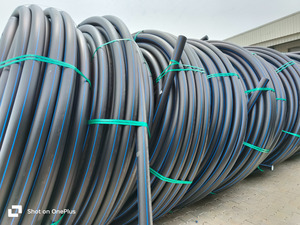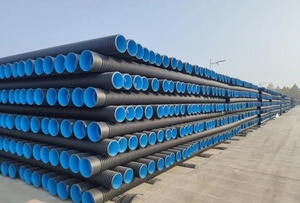(12739 products available)




































































































































































































A black HDPE tube is a tube made of high-density polyethylene (HDPE), a durable plastic material. It is used in various applications, such as construction, automotive, and packaging. The black color helps prevent UV radiation from degrading the material, making it suitable for outdoor use.
Black HDPE tubes are used in various applications, including construction, drainage, transportation of fluids and gases, electrical and telecommunications wiring, and industrial components. The tubes are popular in many industries because of their light weight, strength, and resistance to impact and corrosion.
Below are the different types of black HDPE tubes:
Black HDPE tubes are popular in construction and other industries because they are strong, resistant to corrosion and chemicals, and can be used for many things. Here are some features and functions of black HDPE tubes:
Lightweight:
One of the most important features of a black polyethylene tube is that it is lightweight. This makes it easy to handle and transport over long distances. It also makes it easy to install.
Durability:
These tubes are durable and can survive harsh weather. When exposed to UV rays, these tubes do not degrade quickly. They can also resist impact and are ideal for many applications.
Chemical Resistance:
Black HDPE tubes can resist corrosive chemicals. This makes them ideal for different industries, such as sewage management, chemical processing, and agricultural activities.
Joint options:
There are many ways to connect black HDPE tubes. These include electrofusion, socket fusion, and butt fusion. These joint options create strong and reliable connections that transfer pressure and flow seamlessly.
Creep resistance:
Black HDPE tubes can resist deformation when under constant stress or load for a long time. This is known as creep resistance. This feature is important in applications where pipes are under pressure for many years.
Temperature resistance:
These pipes can operate in high and low temperatures. They are ideal for applications with extreme temperatures, such as geothermal systems and hot water distribution.
Recyclability:
Black HDPE tubes are made from recyclable materials. At the end of their lifespan, these tubes can be recycled to produce new products. This helps to reduce environmental waste and conserve natural resources.
Fluid Flow Capacity:
Because of their smooth interior and exterior surfaces, these tubes have high fluid flow capacity. This makes them ideal in applications like irrigation and water supply where efficient fluid transfer is needed.
Conduits for Electrical and Telecom Cables:
HDPE pipes are widely used as conduits to protect and house electrical wiring and communication cables. Their robustness, resistance to moisture, and ease of installation make them an ideal solution for shielding wires from mechanical damage and environmental factors. Their flexibility is necessary for routing cables across uneven terrains or through tight corners. Additionally, the smooth interior surface of these pipes ensures minimal friction loss, facilitating efficient cable pulling during installation. This application is critical in urban infrastructure, rural electrification projects, and telecom network installations.
Mining and Dredging Operations:
In the mining industry, black hdpe tubes are utilized for slurry transport. Their durability and resistance to abrasive materials allow the efficient transportation of mineral slurries from mining sites to processing plants. Similarly, in dredging activities, these pipes are employed for transporting dredged materials. Their strength and resistance to wear are crucial in maintaining the efficiency of dredging operations.
Drainage and Irrigation Solutions:
These pipes are essential in agricultural settings for efficient water management. Their lightweight nature and flexibility facilitate easy installation of irrigation systems, such as drip and sprinkler systems, ensuring uniform water distribution and enhancing agricultural productivity. Additionally, their ability to transport water over long distances with minimal loss of head makes them ideal for conveying water from sources to farmlands.
Moreover, these pipes are extensively used in urban and rural settings for stormwater and wastewater management. Their structural integrity ensures long-term performance, reducing the risks of leaks that could contaminate soil and groundwater. The smooth inner surface promotes efficient flow, minimizing urban flooding risks associated with rainwater runoff.
Fluid Transport in Industrial Settings:
HDPE pipes are integral in various industries for the transportation of liquids. Their chemical resistance ensures safe and efficient transportation of water, oil, and natural gas. In petrochemical plants, these pipes are used to transport various hydrocarbons safely. Their strength and resistance to chemicals prevent leaks and environmental contamination.
Additionally, in water treatment and distribution facilities, these pipes are used to transport potable water and wastewater. Their smooth interior surface and resistance to biofilm formation ensure clean drinking water delivery. Furthermore, in industrial plants, these pipes are used to transport various fluids, including acids and alkalis, owing to their chemical resistance.
When looking at different kinds of black HDPE tubes, buyers should consider their needs and the kinds of projects they are buying the tubes for. Here are some things to keep in mind when choosing black HDPE tubes:
Think about the application
Consider the application for which the tube is required. Different applications require different kinds of tubes. For example, if the tube is needed for drainage purposes, a tube with perforations will be ideal. On the other hand, if the tube is needed for water supply, a non-perforated tube will be more suitable.
Consider the diameter and wall thickness
HDPE tubes come in different diameters and wall thicknesses. It is important to choose a tube with the right diameter and thickness to ensure it can handle the pressure. More importantly, the tube's diameter should be compatible with the existing plumbing or drainage systems.
Check the quality of the material
When choosing black HDPE tubes, it is important to check the quality of the material. Look for a tube that has been manufactured using high-quality, virgin HDPE material. This material is known for its strength and durability. Also, check if the tube has been tested and certified for different applications.
Flexibility and Stiffness of the Tube
It is also important to determine if the tube needs to be flexible or rigid. Flexible tubes are ideal for applications in areas with irregular terrain. On the other hand, rigid tubes are used in applications that require structural integrity.
Check the manufacturing process
The manufacturing process used to make the black HDPE tubes determines their quality. As a result, it is important to check the manufacturing process. Look for tubes that are manufactured using advanced techniques like extrusion. Also, ensure the tubes go through quality control and inspection processes to guarantee their quality.
Evaluate the Cost
While it is important to consider the cost when choosing black HDPE tubes, it should not be the only factor. A lower price is not always an indicator of good quality. As a result, balance quality and cost when choosing the right tube.
Q1: What does HDPE stand for?
A1: High-Density Polyethylene. It's a type of plastic known for its strength and durability.
Q2: How can one cut a black HDPE tube accurately?
A2: Use a tube cutter or a saw designed for plastic to ensure a straight cut. A fine-toothed saw works best.
Q3: Can HDPE be recycled?
A3: Yes, HDPE is one of the most commonly recycled plastics. Look for recycling bins that accept HDPE products.
Q4: Is HDPE safe for drinking water?
A4: Yes, HDPE is safe for drinking water. It is often used to make water bottles and other containers.
Q5: How can one prevent leaks in HDPE tube connections?
A5: Use compatible adhesives or welding techniques to ensure airtight connections. For threaded connections, use Teflon tape to prevent leaks.